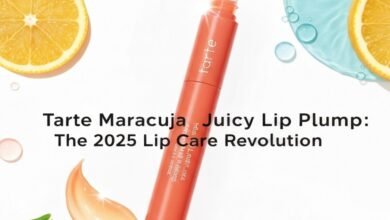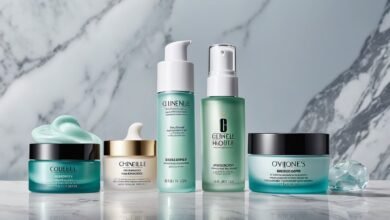Retinol & Retinoid Serums: The Gold Standard of Skincare
When it comes to anti-aging and skin renewal, retinol and retinoid treatments have long been hailed as the ultimate game-changers. Loved by dermatologists, influencers, and skincare enthusiasts, these vitamin A derivatives are more than a passing trend—they’re a science-backed investment in long-term skin health. In 2025, the beauty industry continues to evolve with gentler, more innovative formulations that make these powerhouse ingredients accessible to all skin types.
What Are Retinol & Retinoids? 🔬🌙
At their core, both retinol and retinoids are forms of vitamin A that encourage faster skin cell turnover and stimulate collagen production. The difference lies in strength and speed:
- Retinol 🌟 – Over-the-counter, gentler, and widely available in serums and creams. Best for beginners and sensitive skin.
- Retinoids 💎 – Prescription-strength (like tretinoin or adapalene), more potent, and deliver faster results but can cause more irritation.
Both are highly effective for tackling fine lines, wrinkles, acne, texture, and hyperpigmentation, making them a must-have in modern skincare routines.
Why Retinol Became a Skincare Staple in 2025 🧴📈
The rise of skin minimalism and science-backed beauty has placed retinol at the center of skincare trends. Consumers today prefer ingredients that actually work, and retinol’s proven track record makes it a cult favorite.
Key reasons for its popularity:
- Clinically Proven Results ✅ – Visible improvement in skin tone and texture.
- Accessible Formulations 💧 – Available in serums, oils, night creams, and even cleansers.
- Anti-Aging Hero ⏳ – Reduces wrinkles and fine lines without the need for invasive treatments.
- Acne & Breakout Control 🌿 – Clears clogged pores and prevents future breakouts.
Retinol vs. Retinoid Treatments ⚖️🧪
While both share similar benefits, the choice depends on skin type, tolerance, and goals:
- Retinol Serums 🌟 – Perfect for beginners, younger skin, or those seeking gradual results with minimal irritation. They work slowly but steadily.
- Prescription Retinoids 💎 – Best for stubborn acne, deeper wrinkles, or pigmentation concerns. They act faster but may cause dryness, peeling, or sensitivity in the early stages.
👉 If you’re new to vitamin A, start with retinol serums and upgrade to retinoids only if your skin can handle stronger actives.
Modern Innovations in Retinol Formulations 🚀🧴
In 2025, beauty brands are reimagining retinol with smart technology and skin-friendly blends. Some notable innovations include:
- Encapsulated Retinol 🔐 – Slowly releases into the skin for reduced irritation.
- Bakuchiol Blends 🌱 – Paired with natural alternatives to soothe and enhance results.
- Hydrating Hybrids 💧 – Infused with hyaluronic acid, ceramides, and niacinamide for barrier support.
- Time-Release Formulas ⏳ – Gentle nighttime serums that work while you sleep.
These advancements make retinol safer, more effective, and suitable for daily use—even for sensitive skin types.
Retinol vs. Other Skincare Actives ⚖️🌿
Comparisons are inevitable when choosing treatments. Here’s how retinol stacks up:
- Retinol vs. Vitamin C 🍊 – Vitamin C brightens and protects during the day; retinol repairs and renews at night. They complement rather than compete.
- Retinol vs. AHAs/BHAs 🍃 – Exfoliating acids smooth and unclog pores instantly, while retinol works deeper for long-term collagen support.
- Retinol vs. Peptides 🧬 – Peptides hydrate and plump, but retinol provides stronger anti-aging benefits.
👉 Many 2025 skincare routines layer or alternate these actives for a balanced approach.
How to Use Retinol Safely 🌙⚠️
Retinol and retinoids are powerful but must be used correctly:
- Start slow: 2–3 nights a week, then build up.
- Always use sunscreen in the daytime. ☀️
- Avoid mixing with harsh exfoliants unless guided.
- Pair with soothing moisturizers to reduce irritation.
Skincare trends in 2025 lean toward “skin cycling”—rotating actives like retinol, exfoliants, and barrier-rest days to maximize benefits without overloading the skin.
Who Should Use Retinol? 👩🦱👨🦳
- 20s & Early 30s – Preventative anti-aging and acne control.
- Mid-30s & Beyond – Reduces wrinkles, boosts firmness, evens skin tone.
- Acne-Prone Skin Types – Both teens and adults benefit from retinoids for clearer skin.
Almost everyone can use retinol with proper guidance, making it one of the most versatile treatments on the market.
Pros & Cons of Retinol Treatments ✅⚠️
Pros:
✅ Scientifically proven anti-aging benefits.
✅ Works for acne, pigmentation, and fine lines.
✅ Widely available in affordable OTC options.
✅ Enhanced with new gentle formulations.
Cons:
⚠️ May cause irritation, dryness, or peeling.
⚠️ Requires patience—results take weeks to months.
⚠️ Not safe during pregnancy or breastfeeding.
Final Verdict 🏆✨
Retinol and retinoid treatments remain the gold standard in skincare for 2025. They balance science, innovation, and accessibility—delivering visible, lasting improvements that few other actives can match.
- Choose Retinol Serums if you’re new, want gradual results, or have sensitive skin.
- Opt for Retinoid Treatments if you need stronger, faster action for acne or advanced aging.
In a beauty world filled with fleeting fads, retinol stands tall as the proven, timeless essential. Whether you’re chasing a glow, tackling breakouts, or investing in youthful skin, retinol is the treatment that truly delivers. 🌙💎



